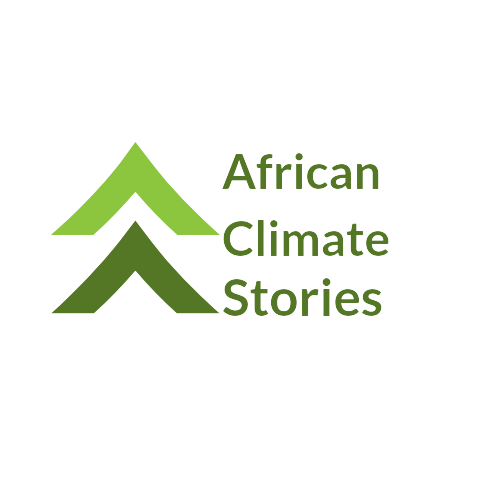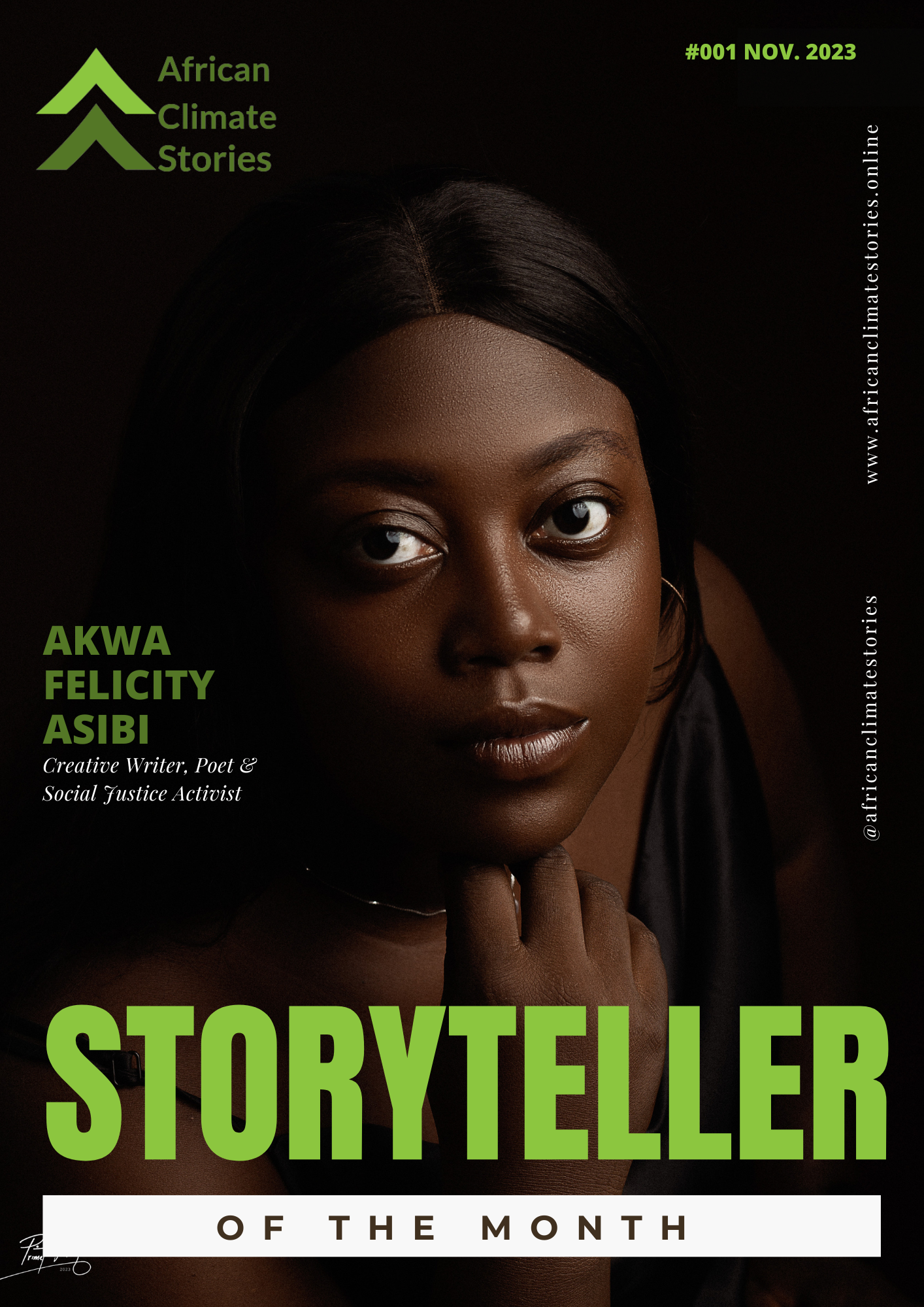Creative storytelling makes complex environmental issues relatable, fostering a sense of urgency and personal connection that traditional communication often lacks. This can drive collective awareness and motivate people to take meaningful steps towards addressing climate change. Join us on a journey unveiling passionate individuals telling tales for environmental consciousness using their creative skills and unique styles. Every month, we will be shining a spotlight on individuals who use the power of storytelling to inspire change and drive action towards a sustainable future, with the hope of inspiring more creatives and storytellers to use their arts and works to drive positive action for our environment.
Drum roll…
Celebrating our first climate storyteller of the month: Akwa Felicity Asibi
Stage Name: Asiibii
I would advice aspiring poets to engage with platforms that provide pertinent education or training on environmental issues. No one can pour from an empty cup; therefore, they have to unlearn, learn, and relearn about the environment constantly.
Can you tell us about your background and what inspired you to become an environmental/climate story poet?
I am a creative writer, social justice activist, and researcher with years’ of experience in administration, creative writing, and data analysis in private and non- profit sectors. I earned a National Innovative Diploma in Computer Hardware Engineering from ECWA International College of Technology in Jos Nigeria, and a Higher National Diploma in Electronics and Telecom Engineering from the Federal Polytechnic Bauchi, Nigeria. I am also the founder of two startup businesses: Sibiscus Coterie Ltd, and Reknuma Foods Processing. I was inspired to be a climate storyteller after my contact with Tearfund Nigeria and Jos Green Centre during a conference in 2019 tagged, ‘The Post-Oil Nigeria’. As a young person who was exposed to the depth of our country’s dependence on oil, and how other communities and countries are developing alternatives around green energy; I was determined to be relevant to Nigeria’s transition towards a green economy. This however was a big vision, so I looked inwards and found out I could as a Poet, engage in climate education/storytelling using my art.
How do you define climate story poetry, and what themes or messages do you aim to convey
through your work?
Climate story poetry is the art of using storytelling and poetry to educate a specific audience
or the general public about the environment, climate change, and how to effectively seek climate
justice. The messages my work aim to convey is encapsulated thus; an awareness that we have an environment we live in and that environment is key to our survival as a people. Furthermore, this environment would thrive or lead us to our doom if we don’t take care of it as we do ourselves.
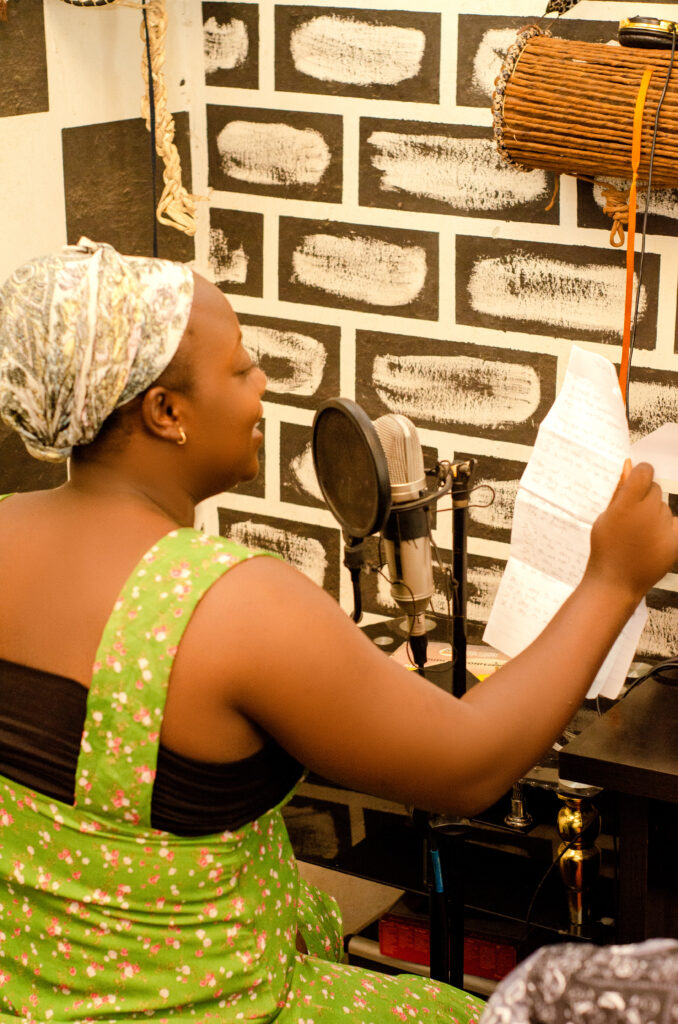
Are there specific environmental or climate issues that deeply resonate with you and influence
your poetry?
Yes, there are. I am most interested in Climate education and waste management.
Could you share some insights into your creative process? How do you go about crafting your
climate-related poems?
My creative process is influenced by the trainings/fellowships/accelerator programs/conferences that I engage myself with. Consequently, the words I need to craft a climate-related poem is influenced by words spoken by an individual, resource – training materials, feedback from discussions, climate-related movies and songs. I may not always quote them verbatim
in my poems, but I find a more passionate way to convey what I’ve heard.
Do you have any favorite poets or literary influences that have shaped your approach to
climate storytelling through poetry?
I have specific poets that have shaped my poetry, but no poets who have shaped my
climate-related poems or storytelling. However, I have organizations such as the Jos Green Centre
and Punchline Poetry Society who continually inspire me through their work and trainings to seek
climate justice using what I have, which is my art.
Can you describe a specific poem or project that holds particular significance to you in the
context of climate change?
My poem ‘Climate Justice’ is part of a social justice advocacy spoken word album titled,
‘We are all Poets’. This poem holds great significance to me because it achieves the vision of
climate education and proffers relevant solutions to realizing climate justice.
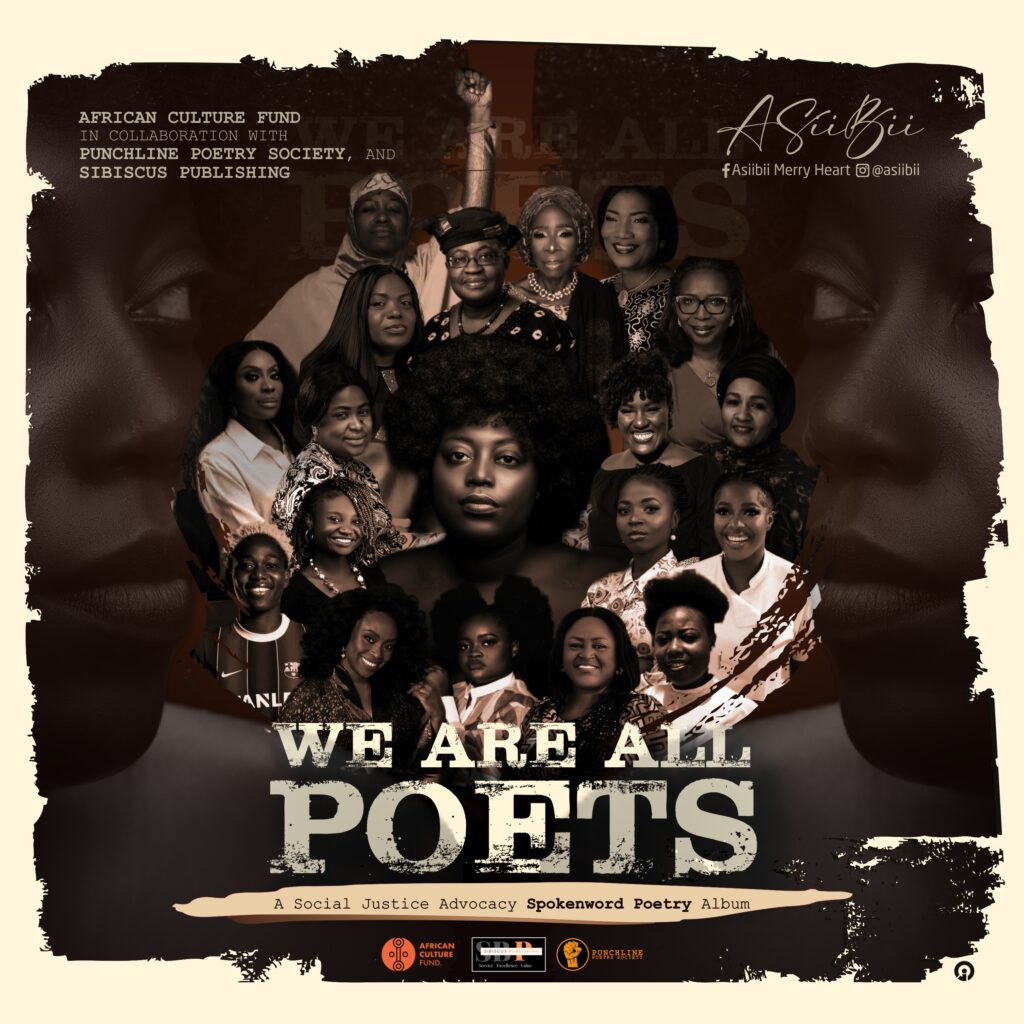
We are all poets by Asiibii
How do you hope your poetry will impact readers and raise awareness about environmental issues?
I am positive that my poetry is positively impacting my audience to know about climate change, and how they can be part of proffering solutions to that. Also, I try to continually engage and partner with platforms and organizations that would give my works better visibility and wider reach.
Are there any events or experiences in your life that have played a significant role in shaping your perspective on climate change and sustainability?
Yes, there are. As aforementioned, the seed of seeking climate justice was sown at the Tearfund’s conference. Subsequently, my volunteerism with the Jos Green Centre and Punchline Poetry Society, engagements with trainings, conferences etc. have played significant roles in shaping my perspective on climate change and sustainability.
Do you collaborate with other artists or organizations to promote climate awareness through your poetry?
Yes, I do. African Culture Fund sponsored the project that housed my poem ‘Climate Justice’. I have received mentorship and training from Jos Green Centre and Punchline Poetry Society; furthermore, I have gained commendations and awards from organizations such as The Environmental Design Studio, The Global Landscape Forum, and of-course; the African Climate Stories.
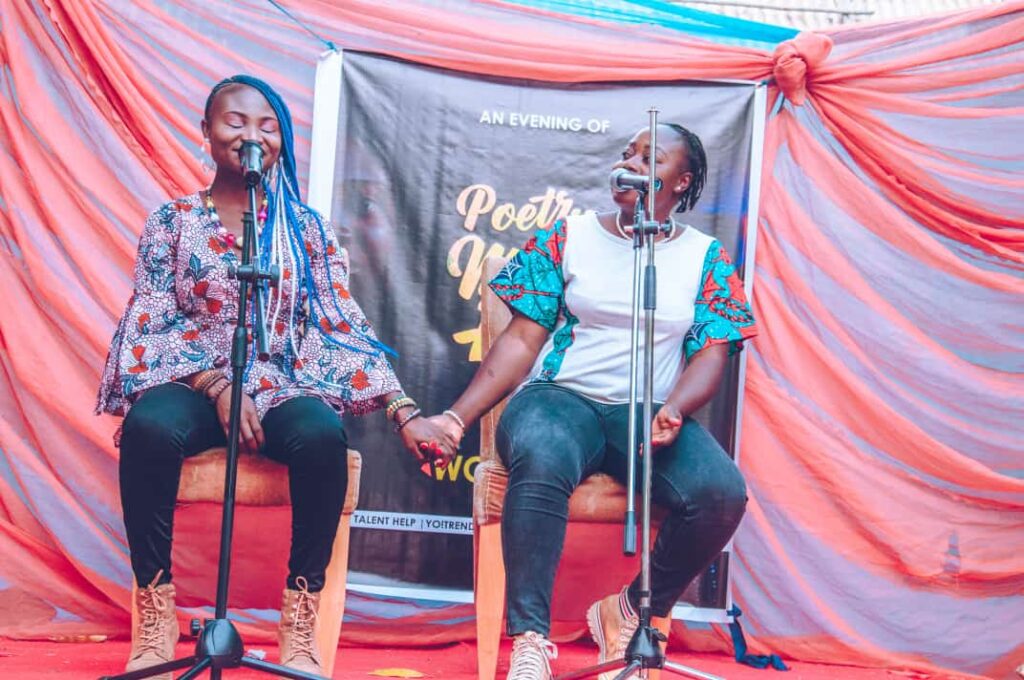
What advice would you give to aspiring poets looking to use their art to address environmental concerns?
I would advice aspiring poets to engage with platforms that provide pertinent education or training on environmental issues. No one can pour from an empty cup; therefore, they have to unlearn, learn, and relearn about the environment constantly. Secondly, they have to invest in seeking partnership with individuals, groups, and organizations that would be important drivers and supporters of the message they want to reach their audience.
Could you share some upcoming projects or initiatives you’re involved in related to climate storytelling through poetry?
I am looking forward to doing a tour with my poem ‘Climate Justice’. The primary targets would be educational institutions from primary to tertiary levels. Furthermore, I have sought sponsorship from an organization to fund a climate-project. Though I have not received feedback yet, but I am hopeful it would pull through successfully.
Is there a specific audience or demographic you aim to reach with your poetry, and how do you tailor your work to engage them effectively?
I would say that my poetry has no restrictions as to a specific audience or demographic, nevertheless, I am passionate about reaching the youthful population of the world. I tailor my work using poetry as a tool; that while they are being entertained, they are also simultaneously being educated.
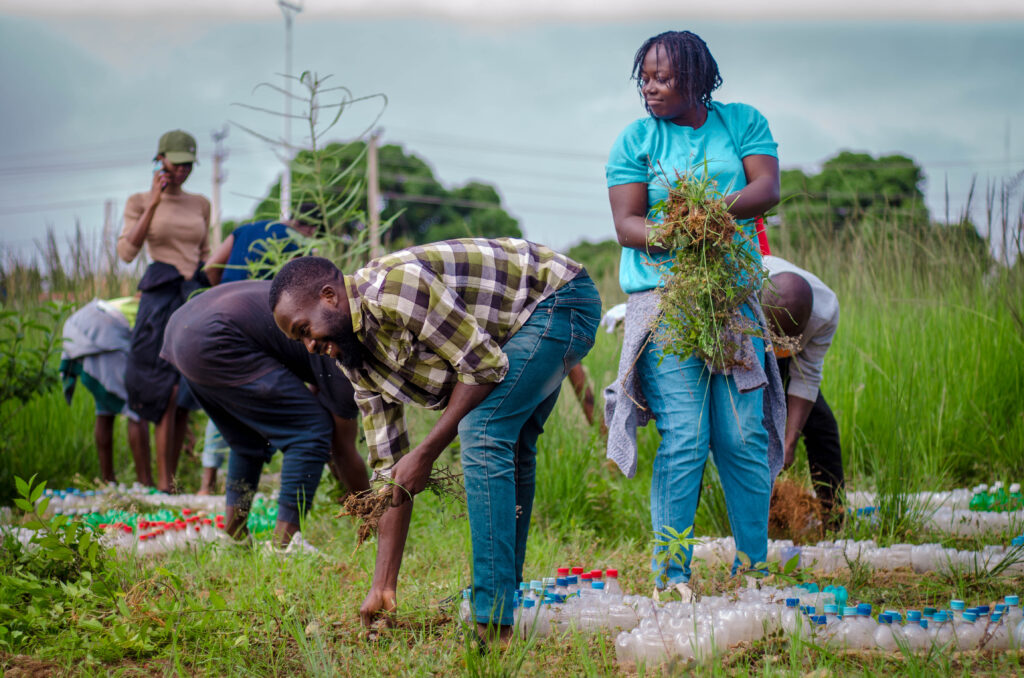
What are some challenges you face as a poet, and how do you overcome them in your creative journey?
One of the most difficult challenges I face as a poet is finding the right words to convey my thoughts. With the way the world has advanced, some words are considered ‘offensive’ to some group of people; therefore, having the ability to weave words that break through any and every person and group comes at a price always. And that price is my time, resource, and research capacity which can lead to both physical and mental exhaustion. When I’m able to surmount this particular challenge, every other thing is easier to deal with.
How has your poetry evolved over time in response to the changing climate and environmental landscape?
firstly, I have continually pushed myself to unlearn, learn, and relearn. I have had to take refresher courses to help me develop poetry that align with global environmental trends and discussions. More so, I have also adapted and accepted that the world is forward-moving, and so should be with my poetry.
Can you recommend some of your favorite environmental or climate-related poems that readers might explore to gain a deeper understanding of your work?
I would love to point them to my website, www.sibiscus.org. there, they would find all my works.
We hope you enjoyed this piece.
If you will like to be featured as one of our Climate Storyteller’s of the month? Kindly use this link to indicate interest or share with friends who qualify: African Climate Stories – Storyteller of the Month.
